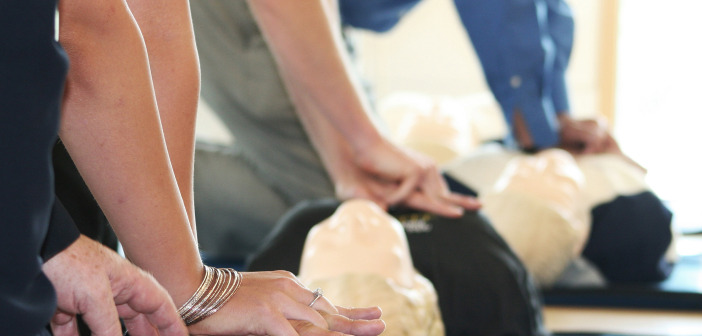First aid training is becoming more widely popular as people work and play in more far-flung areas where medical care may not be available. This training can mean the difference between surviving an injury or illness and succumbing to a sudden emergency. A number of occupations require first aid training because of the high risk of injury or because of ongoing the responsibility for the well being of others.
Police Officers
The police are often first responders at the scene of an accident or other serious event. They may have to deal with severe injuries before the ambulance arrives. In addition, their daily law enforcement work may bring them into contact with gunshot injuries, knife wounds, head injuries or other medical emergencies. Their training in first aid and CPR can be critical when seconds count. Proper training of the police force in first aid can be a significant help to the community in hazardous situations.
Firefighters
Like law enforcement, firefighters are often among the first to be on the scene of an accident, sudden illness or other emergency. They may be required to assist with breathing problems, burns, bleeding wounds, head injuries or other conditions. They must be able to recognize the severity of these problems so that paramedics and other medical personnel can be alerted to provide treatment. However, in the meantime, firefighters may be required to give immediate help to the distressed person, providing basic first aid or CPR until the individual can be properly attended.
Lifeguards
Lifeguards are another occupation that requires first aid training to provide on-the-spot assistance for those who may be drowning victims or injured in the water. Lifeguards are expected to be able to recognize minor conditions and provide immediate first aid whenever necessary in these situations. However, they may also be faced with serious bleeding, open wounds, heat stroke and other problems. In addition, lifeguards must know proper immediate care of neck or spine injuries that may occur during swimming or diving activities. Providing assistance with CPR, helping to stop bleeding and helping to stabilize the position of injured swimmers are just a few of the problems they may face. In some cases, proper first aid training can help to save lives before other medical services arrive on the scene.
Construction Supervisors
Construction work, by its nature, often involves the risk of injury. Vehicles moving on the construction site, personnel working at higher elevations, the hazards of falling materials and the common dangers of using construction equipment increase the risk of injury in these areas. Other injuries related to construction include electrical shock, welding burns, trench collapse and repetitive motion issues. The U.S. Occupational Safety and Health Administration note that the rate of fatal injuries is higher than the national average on construction sites. The noise and confusion at these sites often become a serious distraction for workers. In addition, these workers may not have uniform training in safe working practices, increasing the risk for injury. First aid training for construction supervisors or other designated personnel on the sites can provide immediate assistance for those who are injured, while waiting for emergency medical teams to arrive on the scene.
Flight Attendants
Another occupation that must deal with sudden medical problems is flight attendants. These airborne personnel may be required to administer immediate assistance while waiting to land so that emergency medical treatment can be provided. We talked with Prime Medical Training about several professions and flight attendants was one they mentioned. They said, “these attendants frequently deal with heart attacks, early labor, miscarriage, asthma or other breathing problems, ear disturbances, airsickness, diabetic problems, nosebleeds, as well as bruising or bleeding injuries from turbulence or crash landings. These workers must have top-notch first aid training to provide care until the plane lands and until emergency medical teams arrive.”
https://www.osha.gov/Publications/OSHA3252/3252.html
http://www.redcross.org/take-a-class/program-highlights/lifeguarding




